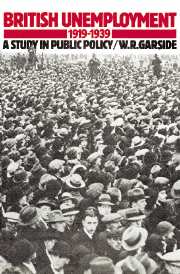Book contents
- Frontmatter
- Contents
- List of tables
- Preface
- Acknowledgements
- PART I INTRODUCTION
- PART II THE LABOUR MARKET UNDER STRAIN
- PART III THE INTERNATIONAL CONTEXT
- PART IV STRUCTURAL UNEMPLOYMENT, INDUSTRY AND THE REGIONS
- PART V MACROECONOMIC POLICY OPTIONS: THEORY AND PRACTICE
- 10 Pricing jobs: the real wage debate and interwar unemployment
- 11 Relief or remedy? The development of public works policy, 1920–1932
- 12 The limits of intervention: budgetary orthodoxy and the reduction of unemployment in the 1920s
- 13 New Deal or no deal? Fiscal policy and the search for stability, 1930–1939
- 14 Conclusion
- Bibliography
- Index
10 - Pricing jobs: the real wage debate and interwar unemployment
Published online by Cambridge University Press: 21 September 2009
- Frontmatter
- Contents
- List of tables
- Preface
- Acknowledgements
- PART I INTRODUCTION
- PART II THE LABOUR MARKET UNDER STRAIN
- PART III THE INTERNATIONAL CONTEXT
- PART IV STRUCTURAL UNEMPLOYMENT, INDUSTRY AND THE REGIONS
- PART V MACROECONOMIC POLICY OPTIONS: THEORY AND PRACTICE
- 10 Pricing jobs: the real wage debate and interwar unemployment
- 11 Relief or remedy? The development of public works policy, 1920–1932
- 12 The limits of intervention: budgetary orthodoxy and the reduction of unemployment in the 1920s
- 13 New Deal or no deal? Fiscal policy and the search for stability, 1930–1939
- 14 Conclusion
- Bibliography
- Index
Summary
During the 1920s few observers inside or outside of government could resist the temptation to blame industrial stagnation, rising unemployment and falling overseas trade upon the failure of money wages to respond freely or adequately to market signals. Accepted economic doctrine taught that the demand for and supply of labour would be rendered equal by the operation of free market forces. The persistence of unemployment convinced contemporaries, therefore, that particular institutional and attitudinal forces were creating market imperfections to the detriment of Britain's economic revival.
This preoccupation with apparent labour market failure proved to be an important element in the evolution of the radical plea for a more interventionist and managed economy in Britain. Mass unemployment convinced Keynes in particular that whatever pure theory might proclaim, once money wages and prices could not and so obviously did not clear markets, for whatever reason, then some alternative strategy had to be adopted. If aggregate demand fell but money wages did not, he was to contend, the labour market would not clear. Even if money wages did fall, there was no guarantee that planned output would settle at a full employment level. This contention raised the intriguing question of whether the unemployment associated with a level of interwar real wages above market clearing levels could have been reduced earlier and more substantially by a mildly inflationary policy of fiscal expansion.
- Type
- Chapter
- Information
- British Unemployment 1919–1939A Study in Public Policy, pp. 281 - 298Publisher: Cambridge University PressPrint publication year: 1990

